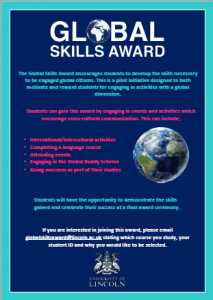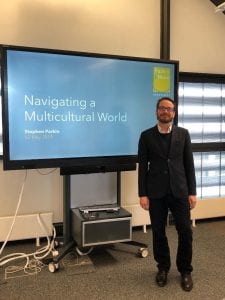The Global Skills Award developed from ideas and discussions within the College’s Internationalisation Working Group. The award is designed to recognise and celebrate the extra-curricular work students undertake to increase their global awareness alongside their chosen degree. It also aims to engage those students who previously had not thought about this aspect of extra-curricular activity, by providing a framework to achieve the award alongside suggestions for how to complete it. The award requires students to complete a minimum of 4 activities that involve an element of intercultural awareness/global skill development conducted during their time at university. Students then reflect on these activities before completing a final reflective piece exploring how the activities have developed their understanding of intercultural issues and enhanced their global skills.

The pilot Global Skills Award ran from January 2019 and the team supported pilot participants via online platforms, face to face engagement and provision of an intercultural awareness session. The team provided a model of reflection for guidance and offered feedback on their submissions.
The Global Skills Award is unique at the University as it encourages and recognises the importance of internationalisation at home and acknowledges the merit of short term mobilities in enhancing the student experience.
The pilot received interest from students across a range of schools within the College. Fourteen students signed up for the pilot period between January and April this year. Of these, three students successfully completed all elements of the award and will receive a certificate. More students have indicated their intention to continue with the award in the next academic year and are planning relevant activities over the summer period or future studies.

The team are in the process of gaining student feedback about the pilot via an online questionnaire, exploring what students feel they have gained, how the award could be improved and whether there is value in continuing the scheme moving forward. The team also obtained student feedback on the workshop ‘Enhancing Intercultural Communication’ which received consistently high praise for the relevance and interesting nature of its content. Student comments highlighted how they would use this knowledge to improve their communication with non-native English language speakers in their university work and future careers.
Another measure of success has been the interest shown in the award from the wider university. The Global Skills Award team are currently in discussion with Opportunities to develop a Global Skills pathway through the Lincoln Award. Similarly, the value of providing intercultural communication workshops to students to encourage and improve cross cultural working has been discussed with Human Resources.
Success can also be seen in the students’ development of reflective practice. By providing the STARS guidance for students to work within they have refined and enhanced their ability to reflect by considering the activity they have undertaken, the benefit and impact of the activity and how they might develop what they have gained in future activities.